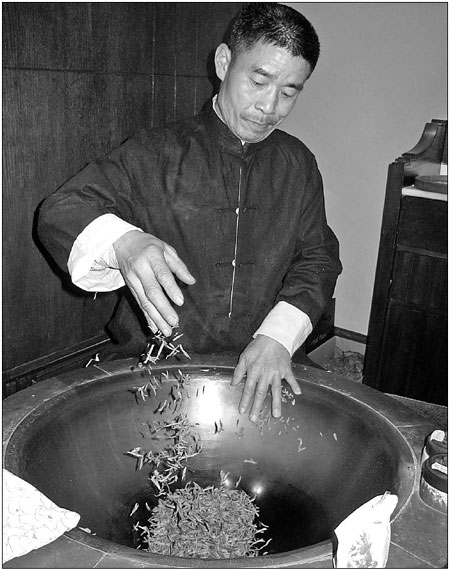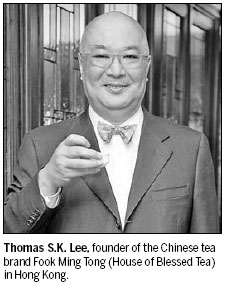A high-life cuppa
 |
|
Wang Yunxiang, a tea farmer in Longjing village of Hangzhou, demonstrates the process of pan-frying tea in Hong Kong.[Photo/China Daily] |

Drinking top quality Longjing is best done in a leisurely fashion by the banks of West Lake, says a tea merchant who is one of its biggest fans. Mu Qian reports.
Teo, tee, thea, herbata, chai, cha ... they are all words that refer to tea, in different languages. The words appear on the packaging of products at Hong Kong's Fook Ming Tong Teashop to reflect a worldwide love for this drink, which originated in China.
"Tea is not only a drink, but also a symbol of Chinese culture," says Thomas S.K. Lee, founder of Fook Ming Tong.
It was in the United Kingdom, however, where Lee began to fall in love with tea, and the reason was a little unusual - he was using tea as a substitute for alcohol.
In the early 1970s, Lee was studying at a UK university, enjoying the freedoms of a young man living away from home and spending a lot of time in bars.
When his parents found out, they imposed economic sanctions on him. Without the money, Lee could no longer hang out in bars, and he felt that life was tasteless.
At that time, he met a store owner in Chinatown, who asked him, "Why don't you drink tea? It's cheaper than wine."
The store owner taught Lee about tea and he has been religiously drinking it since then.
"I thought that I understood tea at that time, but later I found the world of tea to be so rich that I'm still learning today," says Lee, 60.
In the UK, Lee also drank English tea, and learned the etiquette related to it. He found the English paid attention to the ritual of tea drinking, and this has influenced his ideas till today.
After returning to Hong Kong, Lee started work in the luxury business. In 1975 he founded Shiatos Limited, one of the first companies to carry prestigious European brands in Hong Kong. The company became the exclusive Hong Kong distributor of labels such as Baccarat and Lalique, Van Cleef & Arpels, and Bernardaud Limoges.
Lee's companies now own, manage and distribute more than 20 lifestyle brands, including crystal-ware, porcelain, wine, art, jewelry and hair accessories.
But Lee wasn't satisfied with just trading Western luxury goods and thought of tea.
In 1987, Lee founded the Chinese tea brand Fook Ming Tong (House of Blessed Tea), with the aim of promoting the culture of tea drinking and making it more popular internationally.
"I approach tea in the same way as other luxuries - only the top quality will do," Lee says.
One of Fook Ming Tong's best products is Shifeng Pre-Qingming Longjing. Grown in Hangzhou, Zhejiang province, Longjing is China's most famous variety of green tea. The best growing place for Longjing is Shifeng Mountain, while the best Longjing tea leaves are picked in a span of about 10 days before Qingming Festival, which falls approximately on April 5 each year. This is when the tender first spring shoots are picked.
This year, Fook Ming Tong selected no more than 13 kg of premium select Shifeng Pre-Qingming Longjing (Imperial Grade). For 500 grams of this category of tea, 40,000 tea buds were fried and just 200 cans were produced.
"Last year's plentiful rain and snowy winter provided adequate moisture for the growth of tea, so this year's pre-Qingming tea is of better quality compared to the past few years," says Ji Yuqin, a retired researcher with the Tea Research Institute of Chinese Academy of Agricultural Sciences who is now Fook Ming Tong's "tea master-in-chief" - ensuring the quality of the company's products.
The pan-frying of Longjing tea, traditionally done by hand, is a complicated process that consists of 10 methods - dou (shaking), da (slightly pressing), ta (turning), na (slightly ironing), shuai (swinging), zhua (grasping), tui (pushing), kou (hooking), ya (pressing), and mo (rubbing).
The technique of pan-frying Longjing tea was recognized as a national intangible cultural heritage in 2009, yet increasing numbers of tea makers now use machines to do this because it's quicker and easier, and fewer young people are learning the traditional technique.
Lee adheres to frying tea because he believes that the control of time and temperature creates a unique taste that cannot be achieved through machine frying.
Lee has set up a workshop at the home of Wang Yunxiang, a tea farmer in the Longjing village of Hangzhou, to teach young people the technique of pan-frying Longjing tea. At a recent event to showcase tea culture, he also invited Wang to demonstrate the process of pan-frying tea in Hong Kong.
However, Lee says the quality of tea is only one part of appreciating it, and one's mood is sometimes even more important. He says the best way to experience drinking Longjing is to do it on the banks of West Lake in Hangzhou.
"I think it's because most people in big cities live very busy lives, and don't have the leisure to appreciate tea," he says.
He says he enjoys noting how Longjing tea leaves change shape in the water. To him, this is an important part of appreciating Longjing, but nevertheless he admits he is usually too busy working to do so.
"When I take a holiday, one of the things I like to do is to enjoy Longjing in a leisurely fashion. It enables me to appreciate life more," he says.
Compared to his luxury business, Lee's tea business is less profitable. Fook Ming Tong started to make a profit only after 10 years of operation, but Lee says his tea business is personally more rewarding.
Besides Hong Kong, Lee has expanded Fook Ming Tong Teashops into Beijing, Shanghai, Hangzhou, Suzhou and Chongqing. Most of the shops are in upscale shopping malls, where Western luxury goods are sold.
"I want to show people that tea should be an important part of high-quality living for Chinese people," he says.






















